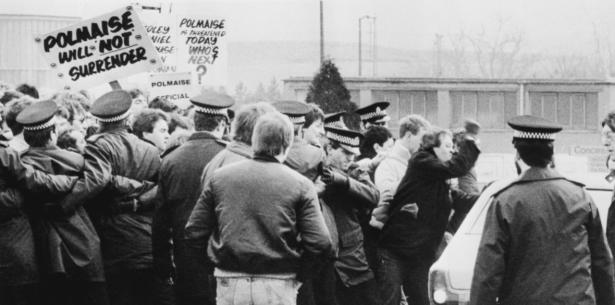PARDONS for Scottish miners convicted during the great miners’ strike of 1984-85 are a victory won through years of determined campaigning.
Former mineworkers, their relatives and trade-union and Labour campaigners such as MSP Neil Findlay can be proud that they have won justice for working-class people fighting for their livelihoods whose reward was brutality and persecution by the British state.
And the Scottish government should be congratulated on its ready acceptance of the need for a pardon in line with the recommendation of the independent inquiry led by John Scott QC, to “remove the stigma” from innocent people who in far too many cases “lost their jobs and futures through being arrested,” in the words of National Union of Mineworkers (Scotland) president Nicky Wilson.
The next step, as Wilson makes clear, is for the labour movement of all the nations of Britain to use Scotland’s decision to press the British government to agree to an inquiry into the behaviour of police during the miners’ strike – in particular regarding the police riot at Orgreave in June 1984. Early Day Motion 904, laid down in the Westminster Parliament by Wansbeck MP Ian Lavery, calls for exactly that and more MPs of all parties should be lobbied to sign.
Successive home secretaries have rejected calls for an inquiry into the unprovoked police assault on unarmed pickets outside the Orgreave coking plant.
Excuses include that policing has changed so much since that there is nothing to learn; that nobody was killed at Orgreave, and there were “no wrongful convictions.”
This is only because the trials of miners the police attempted to fit up for riot – a charge that could have resulted in life imprisonment for those convicted – collapsed when it became clear that police evidence had been manipulated. There is strong evidence that officers colluded to falsify statements on what happened that day.
The true reason governments are afraid of an Orgreave inquiry is because it could expose the role of the British state in the decisive class confrontation of the Thatcher era.
The miners’ defeat paved the way for the gutting of countless communities and an accelerated demolition of trade-union and labour rights across the board. Trade-union resistance to the media demonisation of miners was one motivation for Rupert Murdoch’s determination to break the print unions at Wapping in 1986.
Thatcher’s triumph enabled the fire-sale privatisation of public assets – aerospace, telecoms (BT), oil (BP), gas, airline (BA), water, electricity and steel under her own government, with rail and mail to follow. It saw the creation of the neoliberal economy resting on an underpaid, insecure workforce, disciplined by the existence of mass unemployment.
This deregulated, super-exploitative model is the child of Thatcher’s victory, which is too often portrayed as representing the inevitable march of history – when in fact, as Seumas Milne has exhaustively demonstrated in his book The Enemy Within, the entire might of the British state was mobilised to ensure the miners lost. This involved the police, secret service, army and of course the BBC, which at Orgreave famously reversed the footage so the public saw images of miners charging the police when in fact the police had charged first.
No-one who observed the similarly broad mobilisation of generals, spooks, Civil Service, MPs of all parties, press barons and the public broadcaster to smash the most recent serious challenge to rule by the richest – the Jeremy Corbyn leadership of the Labour Party – can imagine that the ruling class today is any less ruthless.
With public confidence in capitalism at a low ebb and millions ready to challenge Thatcher’s legacy, small wonder that her heirs are unwilling to shed light on the dishonesty and savagery deployed against those who resisted the birth of the neoliberal era.
All the more reason why the truth about the miners’ strike and the British state’s role in it must be exposed.


Spread the word